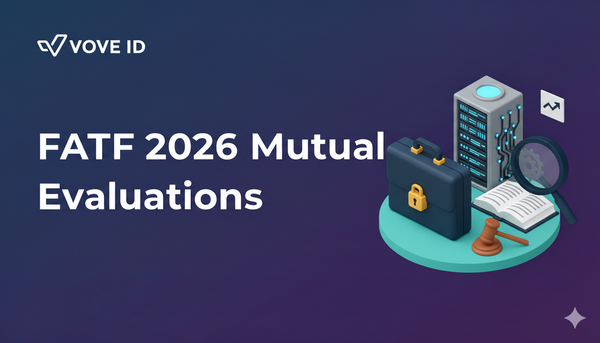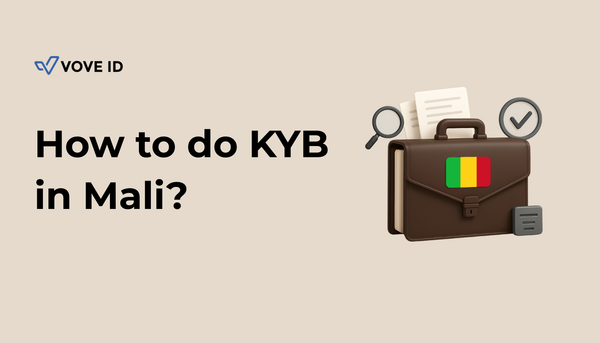AML Compliance in Ghana: A 2025 Guide for Fintechs and Regulated Businesses
Navigate AML compliance in Ghana with this 2025 guide. Learn about Act 1044, BoG and SEC regulations, the 2024 National Risk Assessment, and practical steps for fintechs to stay compliant.

Ghana’s fintech surge, driven by mobile money and digital payments, has made it a West African financial powerhouse. Yet, with growth comes the risk of money laundering, terrorist financing, and fraud. Ghana’s robust Anti-Money Laundering (AML) framework, led by the Anti-Money Laundering Act, 2020 (Act 1044), aligns with Financial Action Task Force (FATF) and GIABA standards. For fintechs and regulated businesses, AML compliance in 2025 is essential for regulatory approval, customer trust, and global partnerships. Tools like VOVE ID simplify compliance with Ghana-specific KYC and KYB solutions, enabling startups to meet regulatory demands efficiently. This guide outlines Ghana’s AML landscape, obligations, and actionable steps for 2025.
Ghana’s AML Regulatory Framework
Core Legislation
The Anti-Money Laundering Act, 2008 (Act 749), amended by Act 874 (2014) and Act 1044 (2020), anchors Ghana’s AML regime. These laws criminalize money laundering, mandate customer due diligence (CDD), and require suspicious transaction reporting (STRs) for accountable institutions, including banks, fintechs, and crypto providers. Supporting laws include:
- Anti-Terrorism Act, 2008 (Act 762): Addresses counter-terrorism financing (CFT).
- Companies Act, 2019 (Act 992): Requires beneficial ownership disclosure.
- Banks and Specialized Deposit-Taking Institutions Act, 2016 (Act 930): Sets AML duties for financial institutions.
The 2024 National Risk Assessment (NRA) identifies mobile money, trade-based laundering, and remittances as high-risk areas. The National AML/CFT/CPF Policy 2025-2029 emphasizes risk-based compliance and transparency.
Supervisory Bodies
- Financial Intelligence Centre (FIC): Ghana’s financial intelligence unit, managing STRs via the goAML platform.
- Bank of Ghana (BoG): Oversees banks, fintechs, and mobile money operators with AML/CFT guidelines.
- Securities and Exchange Commission (SEC): Regulates capital markets with AML/CFT/CPF templates.
- National Insurance Commission (NIC): Supervises insurers.
- Registrar-General’s Department (RGD): Enforces beneficial ownership transparency.
The Ghana Revenue Authority (GRA) and Customs Division address trade-based laundering.
Ghana’s Global AML Standing
Ghana exited the FATF grey list in June 2021 and the EU high-risk list in January 2022, reflecting strengthened AML controls. FATF and GIABA continue monitoring enforcement, urging rigorous oversight. For fintechs, this translates to heightened compliance expectations, particularly in mobile money and forex sectors, to prevent watchlist relapse.
Core AML Obligations
Under Act 1044, regulated businesses must:
- Customer Due Diligence (CDD): Verify identities using reliable documents (e.g., Ghana Card) and apply enhanced due diligence (EDD) for PEPs and high-risk customers.
- Ongoing Monitoring: Review transactions for unusual activity and update customer profiles.
- Record-Keeping: Retain CDD and transaction records for at least five years.
- Suspicious Transaction Reporting (STRs): File STRs promptly via goAML without alerting customers.
- Beneficial Ownership: Disclose ultimate beneficial owners (UBOs) to the RGD.
- Governance: Appoint an AML Reporting Officer (AMLRO), conduct training, and perform audits.
Sector-Specific Requirements
Fintech and Mobile Money
With over 40 million mobile money accounts, this sector faces significant AML risks. BoG guidelines mandate robust eKYC and fraud monitoring.
Banking
Banks must tackle cross-border and trade-based laundering risks, ensuring CDD for complex corporate structures.
Capital Markets
SEC requires STR/CTR templates and compliance programs for broker-dealers and investment advisors.
Crypto and Virtual Assets
Crypto exchanges and wallet providers are accountable institutions under Act 1044, requiring CDD and STR compliance.
Insurance
Life insurers with investment-linked products face increased AML scrutiny.
Challenges for Fintechs
- Resource Constraints: Startups often lack compliance budgets.
- Cash-Driven Economy: High cash usage complicates monitoring.
- Evolving Risks: Mobile fraud and trade-based laundering demand adaptive controls.
- Regulatory Complexity: Navigating BoG, SEC, and RGD rules can overwhelm small teams.
VOVE ID addresses these challenges with automated KYC and KYB tools, offering Ghana Card verification, liveness detection, and beneficial ownership checks aligned with Act 1044 and the 2024 NRA.
Penalties for Non-Compliance
Non-compliance risks:
- Fines from BoG or SEC.
- Account freezes or asset forfeiture.
- Criminal prosecution, including imprisonment.
- Reputational damage and exclusion from global payment networks.
Since 2022, BoG has intensified sanctions for STR and CDD failures, making compliance critical for startups.
Opportunities and Trends in 2025
- Digital Identity: The Ghana Card enhances eKYC, streamlining onboarding.
- AI and RegTech: Machine learning improves fraud detection efficiency.
- Beneficial Ownership: The 2025-2029 policy’s UBO focus aligns with global standards.
- Regional Growth: Ghana’s AfCFTA role creates cross-border opportunities, requiring robust compliance.
Practical Steps for a Ghana-Ready AML Program
- Map Regulations: Align with Act 1044, BoG’s 2022/2024 guidelines, and SEC templates.
- Leverage the 2024 NRA: Update risk assessments to prioritize mobile money and trade risks.
- Strengthen eKYC: Use Ghana Card for digital onboarding and verify UBOs via RGD.
- Automate STR Filing: Rehearse goAML submissions for efficiency.
- Embed Governance: Appoint an AMLRO, log training, and schedule audits.
Is AML compliance mandatory for fintech startups?
Yes, all financial service providers, including fintechs and crypto platforms, are accountable institutions under Act 1044.
How long must records be kept?
At least five years, per AML regulations.
What is the FIC’s role?
The FIC receives and analyzes STRs via goAML and shares intelligence with law enforcement.
Are crypto businesses regulated for AML?
Yes, crypto exchanges and wallets must comply with CDD and STR requirements.
Thrive with Compliance
Ghana’s 2025 AML framework balances innovation with financial integrity. For fintechs, compliance ensures trust, regulatory approval, and global opportunities. By aligning with Act 1044, leveraging the 2024 NRA, and adopting tools like VOVE ID for seamless KYC and KYB, businesses can stay compliant and competitive in Ghana’s dynamic financial ecosystem.
Ensure your business stays compliant and competitive in Ghana’s evolving AML landscape.
Partner with VOVE ID to simplify KYC, KYB, and AML processes today.




